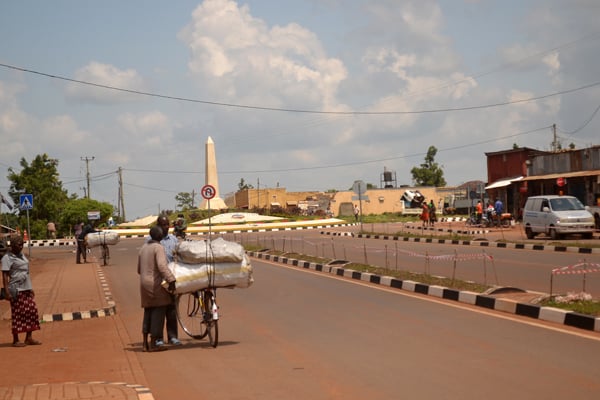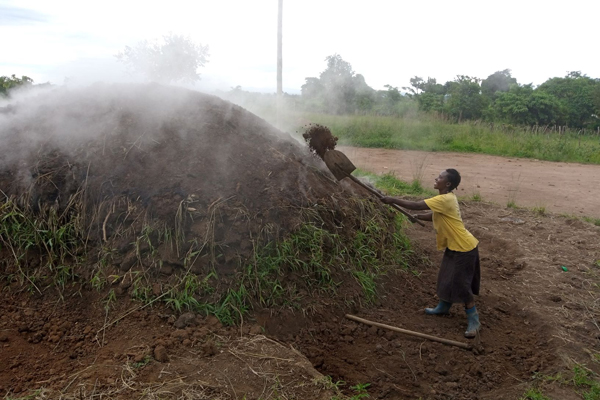Prime
Charcoal scarcity pushes prices up

Men transport charcoal in Kumi Town last week. A sack of charcoal in the area costs Shs70,000. PHOTO/DENIS EDEMA
What you need to know:
- Dealers have to travel to distant places to get good quality charcoal.
Households using charcoal as their main source of fuel should brace for harder times as the price of the commodity continues to shoot through the roof.
In most urban centres in central region districts, charcoal prices have increased from Shs80,000 per sack to Shs100,000 in the past couple of months.
Some charcoal dealers blame the situation on the current downpour in some parts of the country which has made roads in major charcoal producing districts impassable.
Others attribute the scarcity to the increasing export of charcoal to neigbouring countries such as Rwanda and Kenya.
The latter placed a moratorium on logging in 2018 to reduce pressure on the country’s dwindling forest cover, which Uganda has failed to do.
However, the increasing charcoal prices are worrying households and other people in the informal sector, including restaurant operators and chapatti makers.
“Charcoal prices usually skyrocket towards Christmas season, but not to this magnitude,” Ms Stella Namunyimba, a charcoal dealer in Masaka City, says.
Mr Simon Mutumba, a restaurant operator in Nyendo, a Masaka City suburb, says the charcoal is also of poor quality.
“I could have resorted to liquefied natural gas for cooking if I was not managing a restaurant, but it is equally expensive. My workers have improvised and on some days, they use firewood to cut costs,” he says.
Ms Lovince Tibelowoza, a charcoal retailer in Battaka - Nabbingo, on the outskirts of Kampala, says a sack of charcoal goes for Shs120,000 up from Shs80,000 in August and her clients have to make pre-orders as early as a day in advance.
“Prices have been unstable and we are likely to sell a sack at either Shs130,000 or Shs150,000 in the coming couple of weeks. Our suppliers claim there is scarcity of charcoal. They also incur a lot of expenses during transportation,” she says.
According to Mr Wilson Ssenkubugge, a charcoal supplier in Buikwe District, most charcoal transporters charge more money because they use more fuel to transport charcoal.
“Unlike in the past, these days we travel to distant places like Nakasongola District and northern region to get good quality charcoal, which consumes a lot of fuel. It is extremely difficult to get good trees for charcoal in most of central region districts,” he says.
Mr Patrick Bulega,50, a charcoal trader in Mityana Town since 2000, says the prices started rising at the beginning of the year.
Mr Bulega blames the rising prices on district officials who he says over tax charcoal dealers.
“Both district forestry and National Forestry Authority (NFA) officials charge a lot of revenue on charcoal which makes the commodity expensive. In some districts, NFA officials charge Shs5,000 as revenue before it is transported to any destination and when the tax is added to other expenses, including labour and transportation, a trader ends up making no profits,” he says.
According to Mr John Tindyebwa, a charcoal dealer in Sembabule District, the price of a sack of charcoal has reached Shs70,000 as a result of Shs2,000 tax levied on every sack, making the commodity expensive to the end user.
Residents of Kigezi Sub-region have also been forced to dig deeper into their pockets to buy charcoal.
Ms Mauda Mweteise, a charcoal dealer in Kabale Town, says the cost of one bag of charcoal depends on the type of wood used. For example, a bag of charcoal made out of eucalyptus trees has increased from Shs18,000 to Shs29,000 while that of the different types of acacias ranges between Shs35,000 and Shs45,000.
“Increased transport costs which are driven by high prices of diesel are responsible for the increased price of a bag of charcoal here. We used to pay Shs2,000 per bag of charcoal as transport costs, but now the price has increased to Shs6,000. This means that we have to increase the prices of the bag of charcoal from Shs18, 000 to Shs29, 000 so that we can also make some profit,” Ms Mweteise says.
According to Mr Michael Ssengendo, the Mpigi District forestry officer, the collected revenue goes to district coffers and is later used to deliver other services.
“Each district sets its own levy.In Mpigi, we no longer have trees for charcoal, but in Butambala and Gomba, I hear they charge like Shs1,000 or Shs2,000 per sack,” he says.
Mr John Kibuuka, the NFA manager in-charge of Mpanga sector, says the law requires that charcoal dealers secure a burning licence, charcoal movement permit and charcoal trading licence –which many don’t have.
“So, securing the three licences has been a challenge to many dealers, which has forced some to quit the business, leading to scarcity. But we rarely give charcoal licences because that practice (burning) is not permitted in our forest reserves,” he says.
Ms Grecier Ainembabazi Rugyendo, a restaurant operator in Rubanda District, says high charcoal prices have forced her to increase the price of food.
“Before the increase in charcoal prices, the price of a meal of beans served with matooke, potatoes and posho (maize flour) was Shs2,500, but it is now at Shs4,000. This has been done to be able to meet these increased costs and also make profits,” she says.
In Kyenjojo District, where there are many charcoal dealers, a sack costs between Shs30,000 and Shs40,000 up from Shs27,000 to Shs35,000 in June depending on the type of tree one uses to burn charcoal.

A woman covers a kiln at a charcoal production site in Kakumiro District last week. PHOTO/ALEX TUMUHIMBISE
In Kasese District, a sack is sold between Shs50,000 and Shs90,000.
She says they are currently getting charcoal from Kamwenge and Kyenjojo districts, adding that the owner of the vehicle also increased transport costs.She also pays labourers to load and offload it.
Mr James Musana, a charcoal dealer in Matale Sub-county, Kibaale District, says he sells a sack at Shs30,000 up from Shs27,000 three months ago.
“We use machines which consume fuel to cut down trees and a litre of petrol here costst Shs6,300,” he says.
Ms Juliet Aketch, a juice seller at Soroti Owino Market, says a sack of shea-nut charcoal is currently being sold at Shs80,000 while a sack of charcoal made from other trees goes for Shs60,000 to Shs70,000.
She adds for families that can’t afford a bag, a basin of charcoal goes for Shs20,000. Ms Aketch says the demand for charcoal is high yet the supply remains low.
A number of trucks carrying charcoal from Karamoja, and northern Teso destined for Busia and Kampala respectively are a common sight in Soroti City with some developing mechanical breakdown along the way.
In Mbarara City, a sack of charcoal costs between Shs60,000 and Shs70,000 depending on the quality, but it has become difficult for burners to get trees.
“Those who buy in small quantities are cheated because we also try to ensure that we get profit and we end up reducing the quantity. For example, we used to sell a smallest size of charcoal that fits in small bucket at Shs5,000, but it is now costs Shs7,000,” Ms Betty Mbabazi, a charcoal trader in Mbarara City, says.
In Arua District, charcoal production has continued to thrive even when there is an ordinance banning the business. Fleets of trucks from Kampala manoeuvre through the villages to be loaded with charcoal. This, according to Mr Joseph Acidri, a resident of Rhino Camp Town Council, has led to a hike in charcoal prices.
“A sack of charcoal that used to cost Shs30,000 three months ago, is now sold at Shs45,000. So, people are in business and this has made it hard for the dealers to stop charcoal business in order to save our trees,” he says.
In Pakwach District, Mr Ronald Odia, chairperson of Alwi Sub-county, says they have suspended licences for the large scale charcoal business and its transportation out of the area to reduce charcoal production.
Alwi used to have thick natural forests, but some have been cleared to meet the financial needs of villagers.
An environmental activist under Pakwach Youth Junction, a community based organisation, Mr Moses Otim, says more than 10 tonnes of charcoal are transported to Kampala weekly from Alwi and Pukwero sub-counties.
Background
More than 90 percent of Ugandans rely on wood for cooking, with the urban population using mainly charcoal while their rural counterparts use firewood. The country’s forest cover has reduced from 24 percent in the 1990s to 8 percent currently. If deforestation continues at the present rate, Uganda is expected to lose all its forest by 2050. According to United Nations, as of 2018, only a little over 42 percent of Ugandans had access to electricity — many were too poor to afford it. Statistics add that between 2016 and 2017, 90 percent of all households burned wood fuel for cooking. In July, government launched a Shs900b project through which one million households will receive gas cylinders to promote cleaner energy. However, each household has to prove that they can afford to refill the cylinder at Shs100,000, according to Energy minister Ruth Nankabirwa.
Compiled by Al-Mahdi Ssenkabirwa, Alex Ashaba,Alex Tumuhimbise ,Robert Muhereza, Obed Kankiriho, Naume Biira, Felix Ainebyoona,Brian Adams Kesiime, Abubaker Kirunda, Denis Edema , Tausi Nakato Simon Peter Emwamu,Felix Warom Okello and Patrick Okaba




